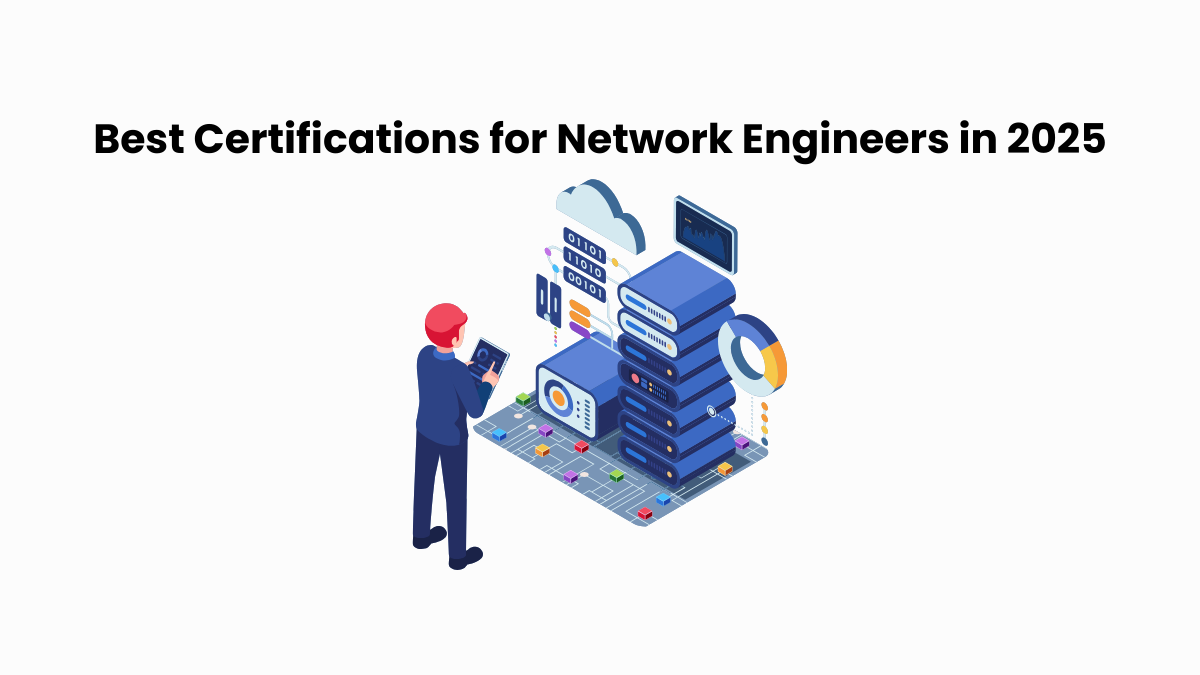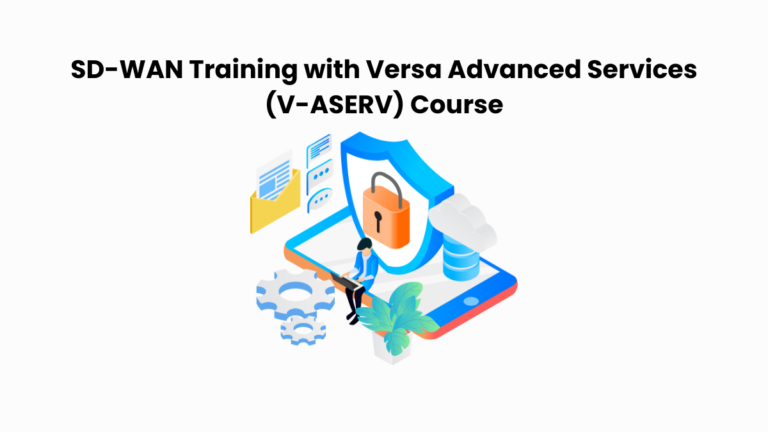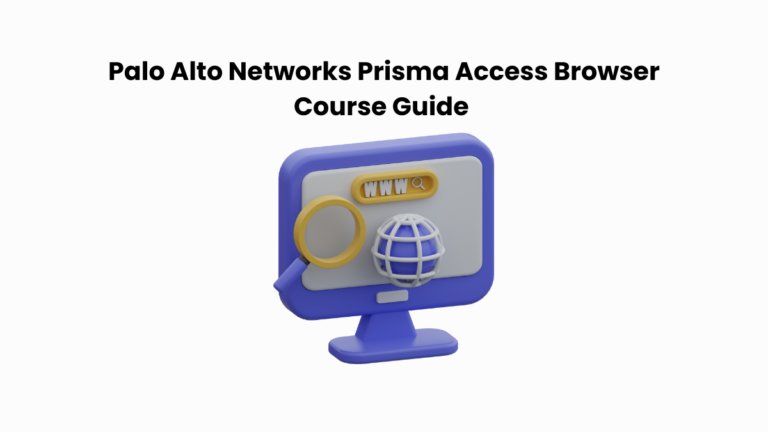Certifications do more than add credibility to your resume. They open doors at every stage of a career.
If you are just beginning, they help you prove skills and land that first job. If you are mid-career, they create the credibility needed to step into bigger roles or manage more complex projects. For senior engineers, they ensure you stay aligned with advances in cloud, virtualization, and security.
Some certifications validate broad networking knowledge, while others are vendor-specific and respected as the gold standard in their fields. A complete career path requires a mix of both.
This article is designed to guide network engineers at every level. You will discover the certifications that employers value today and understand how each one can support your growth.
From foundational programs to advanced specializations, consider this your roadmap to building expertise, unlocking promotions, and staying relevant in a competitive industry.
Best Certifications for Network Engineers in 2025
The certifications highlighted in this guide represent the most relevant and respected paths for today’s network engineers.
Each one validates skills that employers actively seek, from foundational networking knowledge to advanced expertise in cloud, virtualization, and vendor technologies. Here are the certifications we will explore in detail today:
- CompTIA Network+
- Cisco Certified Network Associate (CCNA)
- Juniper Networks Certified Associate – JNCIA-Junos
- AWS Certified Advanced Networking – Specialty
- EC-Council Certified Network Defender (CND)
- Microsoft Certified: Azure Network Engineer Associate
- VMware Certified Professional – Network Virtualization (VCP-NV)
- CWNA – Certified Wireless Network Administrator
- Check Point Certified Security Administrator (CCSA)
- Palo Alto Networks Certified Network Security Professional
- HPE Aruba Networking Certified Professional – Switching
Let us start with the first certification in the series:
1. CompTIA Network+
CompTIA Network+ is the go-to certification for building a career in networking. Designed for beginners and early career professionals, it proves you can handle the fundamentals that keep modern networks running.

Source – CompTIA
The certification covers core areas such as connectivity, configuration, cloud concepts, virtualization, monitoring, troubleshooting, and basic security hardening.
It ensures you can work confidently with wired and wireless environments, understand common protocols, and apply best practices in documentation and operations.
The recommended experience for this certification is 9-12 months in a junior network administrator or support role, ideally with CompTIA A+ as a foundation.
Employers recognize this certification as a trusted entry point into roles such as technical support specialist, network operations specialist, and system administrator.
Datacipher Recommends
- Start here if you are beginning your journey in networking or want a vendor-neutral foundation before pursuing Cisco, Juniper, or cloud-specific paths.
- Avoid if you are already running enterprise-scale networks. At that stage, certifications like CCNP or AWS Advanced Networking Specialty will give you more career impact.
- Exam insight: The Network+ (N10-009) exam has up to 90 questions, including multiple choice and performance-based tasks, to be completed in 90 minutes. The passing score is 720 out of 900.
- Best prep format: You can consider pairing official study guides with hands-on labs. Practicing troubleshooting, VLAN setup, routing basics, and packet captures will help you handle the performance-based items with confidence.
2. Cisco Certified Network Associate (CCNA)
The Cisco Certified Network Associate is one of the most widely recognized credentials for IT professionals entering or growing in networking. It validates your skills across network fundamentals, IP connectivity, IP services, security, and automation, proving you can keep modern enterprise networks connected and secure.
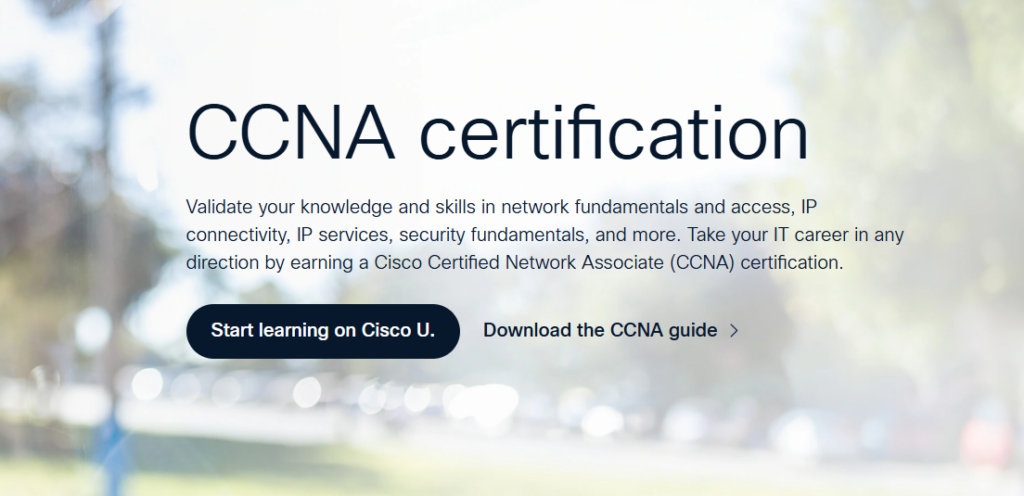
Source: Cisco
There are no formal prerequisites, though Cisco recommends at least a year of experience implementing and administering solutions. To earn the certification, you must pass a single exam that covers everything from routing tables and redundancy protocols to setting up secure device access and working with APIs.
CCNA is often the first step into roles such as help desk administrator, network administrator, or network engineer. Because it spans multiple IT fundamentals, it remains a powerful way to stand out in a competitive job market.
Datacipher Recommends
- Start here if you are beginning a career in IT or want to transition into networking with a globally recognized credential. CCNA gives you the foundation to step into roles such as help desk administrator, network administrator, or junior network engineer.
- Avoid if you already manage complex enterprise networks or hold advanced vendor certifications. In that case, certifications like CCNP Enterprise or AWS Advanced Networking Specialty will provide greater career leverage.
- Exam insight: The CCNA exam (200-301) consists of a single test covering network fundamentals, IP services, security, and automation. You will need to complete the exam in 120 minutes, and the certification is valid for three years.
- Best prep format: Cisco offers guided learning, practice labs, and community forums. Pair this with lab-based practice on routing, VLANs, and secure access configurations to gain real confidence before test day.
3. Juniper Networks Certified Associate – JNCIA-Junos
The Juniper Networks Certified Associate (JNCIA-Junos) is the starting point for professionals who want to work with Juniper technologies. It verifies that you understand the Junos operating system and the fundamentals of routing, switching, and basic configuration.
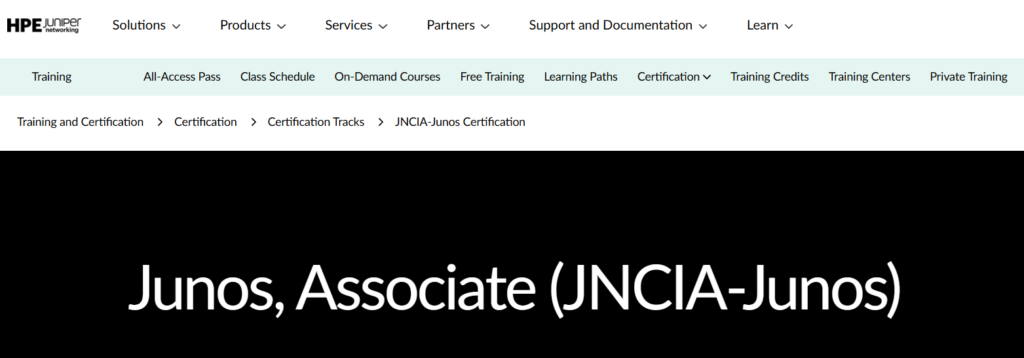
Source: Juniper
Because it focuses on Junos OS, this certification serves as the baseline for advanced Juniper tracks such as Enterprise Routing and Switching or Service Provider Routing and Switching. You will demonstrate your ability to navigate the CLI, set up initial configurations, monitor device performance, and apply routing policies or firewall filters.
There are no prerequisites, making JNCIA-Junos accessible to anyone with beginner to intermediate networking knowledge. It is an excellent entry for engineers looking to build multi-vendor expertise and stand out in environments where Juniper powers core network infrastructure.
Note: Datacipher offers official Juniper Networks training that supports this certification with hands-on labs and real-world scenarios.
Datacipher Recommends
- Start here if you want to add Juniper skills to your profile or work in environments that rely on Junos devices. It is the right entry point if you are beginning with routing and switching or planning to move toward Juniper’s professional tracks.
- Avoid if your focus is strictly Cisco or cloud networking, and you have no plan to work with Junos infrastructure. In that case, certifications like CCNA or AWS Advanced Networking Specialty may deliver more direct value.
- Exam insight: The JNCIA-Junos exam (JN0-105) consists of 65 multiple-choice questions, delivered in 90 minutes, with no prerequisites. It is valid for three years.
- Best prep format: Pair Juniper’s official “Networking Technology Foundations” and “Introduction to Junos OS” courses with hands-on CLI practice. Focus on configurations, monitoring commands, and routing policies to build confidence for real-world tasks.
4. AWS Certified Advanced Networking – Specialty
The AWS Certified Advanced Networking – Specialty is designed for experienced professionals who architect and manage complex network solutions on AWS. It validates deep expertise in areas such as hybrid and multi-region architectures, advanced routing protocols, and security features, including AWS WAF, IDS/IPS, and DDoS protection.
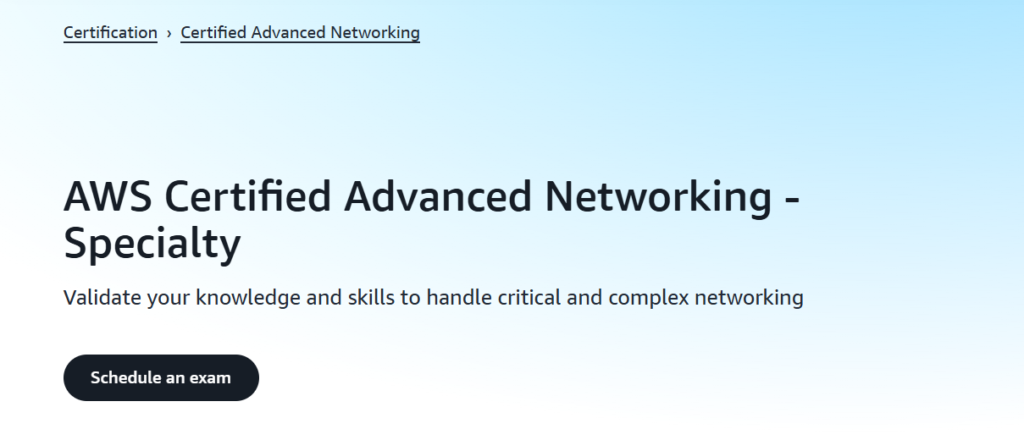
Source: AWS
The ideal candidate should have at least five years of hands-on networking experience and two or more years working with cloud or hybrid networking. Many candidates benefit from earning an AWS Associate or Professional certification before attempting this exam.
With its focus on enterprise-scale design and secure connectivity, it has become one of the most respected cloud networking credentials, opening doors to senior roles in cloud architecture and network engineering.
Datacipher Recommends
- Start here if you already design or operate large-scale AWS networks and want to validate the expertise that employers look for in senior cloud networking roles.
- Avoid if you are early in your career or lack practical AWS experience. Begin with AWS Solutions Architect – Associate or Professional before attempting this Specialty exam.
- Exam insight: The test consists of 65 multiple-choice or multiple-response questions, lasts 170 minutes, and costs 300 USD. It is valid for three years.
- Best prep format: You can consider using AWS Skill Builder with Builder Labs and Jam sessions for real-world scenarios. Focus especially on VPC design, automation workflows, and integrating AWS networking with enterprise systems.
5. EC-Council Certified Network Defender (CND)
The Certified Network Defender (CND) is designed to train network administrators and engineers to protect, detect, and respond to modern threats. Unlike certifications that focus only on theory, CND is skills-based and lab-intensive, aligned with the NICE Cybersecurity Workforce framework.

Source: EC-Council
The program equips candidates with an understanding of how data moves across networks, how software automates key functions, and how to apply effective security controls. It covers fundamentals such as IDS and VPN configuration, firewall policies, network traffic analysis, and vulnerability scanning.
By mastering these areas, professionals can design resilient network defenses and build incident response strategies that ensure continuity of operations during attacks.
CND is suitable for network administrators, security engineers, defense technicians, and analysts who want to transition from maintaining networks to actively defending them.
Datacipher Recommends
- Start here if you are a network administrator or technician looking to gain hands-on defensive skills and move into network security operations.
- Avoid if your current role is already focused on advanced security architecture or threat hunting; certifications like CISSP or CCNP Security may be more aligned.
- Exam insight: The CND exam (312-38) consists of 100 questions, lasts four hours, and has a variable passing score between 60% and 85%, depending on the form.
- Best prep format: You can consider choosing lab-intensive training that mirrors real network defense scenarios. Focus on IDS/IPS tuning, VPN and firewall configuration, and traffic signature analysis to reinforce practical skills for both the exam and on-the-job impact.
6. Microsoft Certified: Azure Network Engineer Associate
The Microsoft Certified: Azure Network Engineer Associate is an intermediate-level certification that validates your ability to design, implement, and manage Azure networking solutions. It proves you can optimize performance, resiliency, scalability, and security for workloads running on Azure.

Source: Microsoft
The certification assesses skills across core network infrastructure, hybrid connectivity, application delivery, private access to Azure services, and network security.
Candidates should have experience with compute, storage, and networking resources in Azure, as well as a grounding in networking fundamentals such as name resolution, protocols, and IP address management.
With enterprises heavily invested in Microsoft cloud ecosystems, this certification positions you for roles focused on secure and efficient Azure deployments.
Datacipher Recommends
- Start here if you are an IT or network professional already working with Azure infrastructure and want to prove your ability to manage networking at scale in Microsoft’s cloud.
- Avoid if you lack hands-on Azure experience. Begin with Azure Fundamentals or Azure Administrator before attempting this certification.
- Exam insight: The AZ-700 exam lasts 100 minutes and covers the design, implementation, and management of Azure networking. The certification is valid for one year and can be renewed with an online assessment.
- Best prep format: Follow Microsoft Learn’s guided course Design and Implement Microsoft Azure Network Solutions, and practice with exam sandboxes and assessments. Reinforce skills with labs that cover hybrid connectivity, load balancing, and securing Azure resources.
7. VMware Certified Professional – Network Virtualization (VCP-NV)
The VMware Certified Professional – Network Virtualization (VCP-NV) validates your ability to install, configure, manage, and troubleshoot VMware NSX environments. It demonstrates practical skills in deploying and optimizing network virtualization solutions using VMware’s Virtual Cloud Network framework.
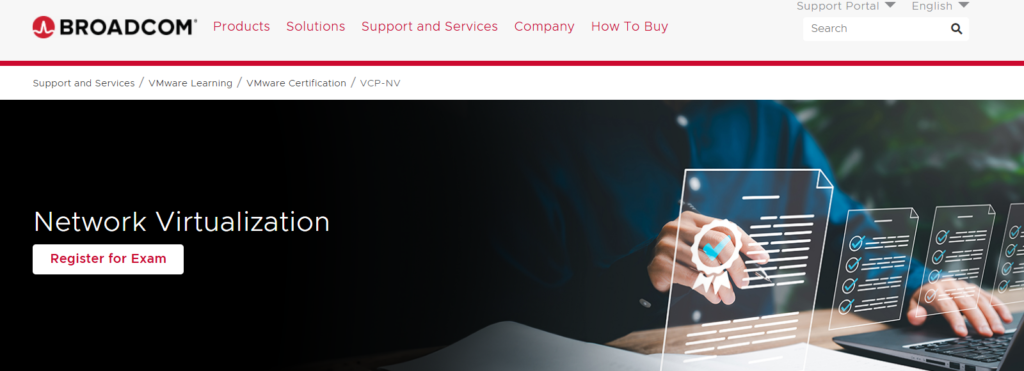
Source – VMware
The certification is anchored on NSX, VMware’s flagship software-defined networking platform. It covers key areas such as logical switching and routing, security policies, VPNs, network address translation, and multi-tenant architectures.
With enterprises increasingly adopting NSX for microsegmentation, automation, and hybrid cloud networking, VCP-NV is a valuable credential for professionals who want to specialize in virtualized data center and cloud environments.
Candidates should have at least six months of hands-on experience with VMware NSX solutions and two years of general IT experience. The certification is best suited for network administrators, virtualization engineers, and systems engineers aiming to transition into advanced network virtualization roles.
Datacipher Recommends
- Start here if you already work with VMware vSphere and want to expand into NSX-driven network virtualization. It is especially useful for administrators managing hybrid data centers or organizations adopting microsegmentation.
- Avoid if you have no prior exposure to VMware environments. In that case, start with VMware vSphere certifications or CompTIA Network+ before pursuing VCP-NV.
- Exam insight: The NSX 4.x Professional V2 exam (2V0-41.24) has 55 questions, a 135-minute duration, and a scaled passing score of 300. Delivered via Pearson VUE, it includes multiple-choice, drag-and-drop, and simulation-style items.
- Best prep format: VMware recommends the “NSX: Install, Configure, Manage 4.x” course. You can combine official training with lab practice in configuring transport zones, logical switches, routing, and VPNs for real-world readiness.
8. AI Certs: AI+ Network Certification
The AI+ Network certification from AI Certs is built for professionals who want to merge traditional networking expertise with artificial intelligence, automation, and future-ready technologies. It covers the foundations of LAN, WAN, and network security, while expanding into advanced areas like 5G, IoT, and cloud networking.
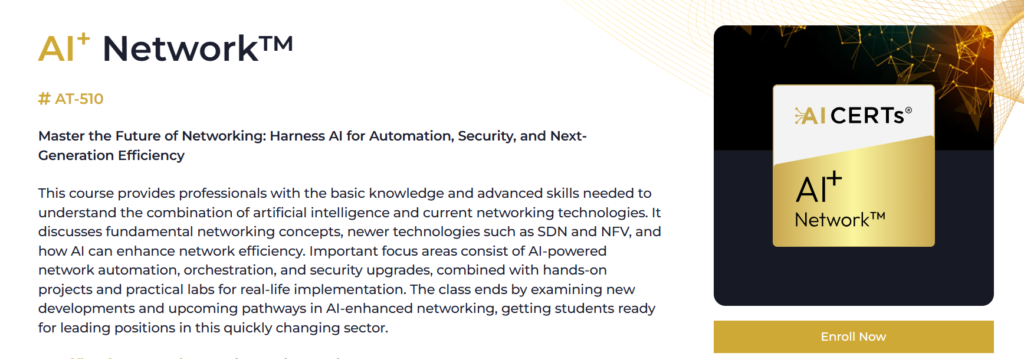
Source – AI Certs
Where this certification stands apart is in its deep integration of AI. Candidates explore machine learning for traffic optimization, anomaly detection, and predictive maintenance. Modules also include automation and orchestration with tools like Ansible, Kubernetes, and TensorFlow, as well as AI-enhanced network security through zero-trust design and real-time threat detection.
The program requires a basic understanding of networking, familiarity with Python, and a working knowledge of AI/ML concepts. With labs and capstone projects, it ensures that learners not only absorb theory but also build AI-driven solutions for real-world network challenges.
Note: Datacipher offers official AICerts training that supports this certification with hands-on labs and real-world scenarios. Find more about the certification here.
Datacipher Recommends
- Start here if you are a networking professional or IT specialist ready to expand your skillset with AI-driven automation, orchestration, and security. It’s also a strong choice for cybersecurity analysts and system administrators looking to pivot into AI-enhanced operations.
- Avoid if you have no prior exposure to networking or programming. Begin with a foundational credential like CompTIA Network+ or vendor-specific associate-level certifications first.
- Exam insight: The AI+ Network certification is structured around seven modules, from foundations to emerging trends. It combines theoretical study with simulation labs and a final capstone project to prove readiness.
- Best prep format: Engage fully with the practical labs and hands-on projects, using simulation tools like GNS3 and Packet Tracer. Focus on applying AI techniques in network automation, security analytics, and SD-WAN optimization.
9. Check Point Certified Security Administrator (CCSA)
The Check Point Certified Security Administrator validates your ability to configure, manage, and monitor a Quantum Security environment. You learn to work confidently in the Gaia Portal and CLI. You also learn to manage administrator access, build network objects, and create security policies that use ordered layers and shared inline layers.

Sourc
e: Check Point
CCSA is designed for security administrators, engineers, analysts, consultants, and architects who manage Check Point next-generation firewalls and security management. Candidates should be comfortable with Unix or Windows administration.
They should also have a foundation in internet fundamentals, networking, network security, system administration, and TCP IP. The core training is a three-day instructor-led course aligned to release R82 with hands-on labs in SmartConsole and Gaia.
Note: Datacipher offers official Check Point Software training that supports this certification with hands-on labs and real-world scenarios. Learn more about this course here.
Datacipher Recommends
- Start here if you manage Check Point gateways or security management and need hands-on skills for policy design, identity controls, and inspection features across enterprise networks.
- Avoid if your path is strictly general networking with no security responsibilities. In that case, focus on CCNA or JNCIA first and return to CCSA when you own firewall and policy administration.
- Exam insight: Certification exam 156 215.82 is proctored through Pearson VUE. It assesses configuration, policy management, monitoring, and core platform operations on Quantum.
- Best prep format: You can first take the R82 CCSA course and complete every lab. Prioritize modules like SmartConsole object management, policy layers, Gaia administration, Identity Awareness, HTTPS Inspection, Application Control, URL Filtering, and threat prevention tuning.
10. Palo Alto Networks Certified Network Security Professional
The Palo Alto Networks Certified Network Security Professional certification validates your ability to configure, maintain, and secure networks using Palo Alto’s full suite of solutions. It goes beyond basic firewall management to cover Strata, Prisma SD-WAN, Prisma Access, and Cloud-Delivered Security Services.
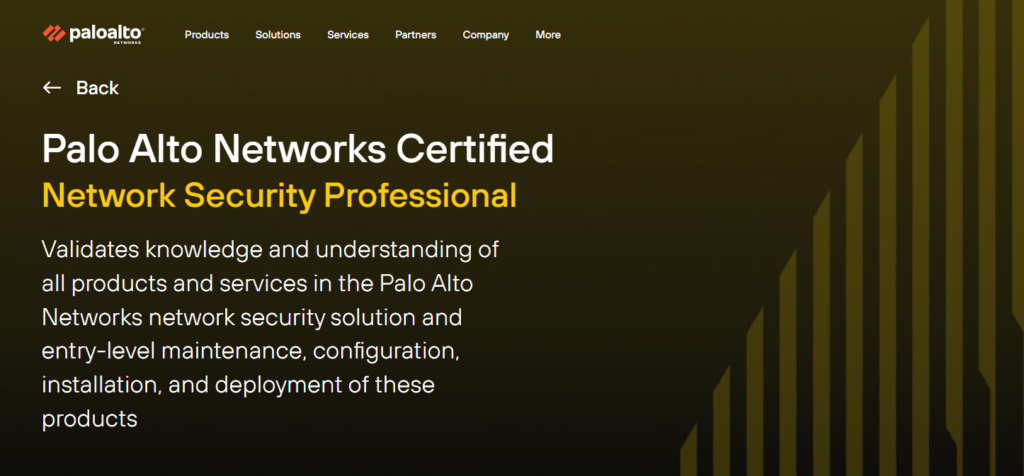
Source – Palo Alto Networks
This certification is designed for professionals who deploy or manage Palo Alto’s next-generation security platforms in enterprise, hybrid, and cloud environments. It ensures that candidates can apply security policies, configure decryption, and manage segmentation.
It also ensures that they are able to integrate centralized tools like Panorama and Strata Cloud Manager. You also demonstrate understanding of IoT, SaaS, and remote access security, reflecting today’s complex enterprise use cases.
Note: Datacipher offers official Palo Alto Networks training that supports this certification with hands-on labs and real-world scenarios.
Datacipher Recommends
- Start here if you are already working with Palo Alto NGFWs, Prisma Access, or Prisma SD-WAN and want to demonstrate advanced configuration and troubleshooting expertise.
- Avoid if you lack prior exposure to Palo Alto solutions. Begin with foundational networking certifications before attempting PCNSP.
- Exam insight: The PCNSP exam runs 90 minutes, includes multiple-choice questions, and is delivered via Pearson VUE at a cost of $200 USD. It tests across six core domains: fundamentals, NGFW/SASE functionality, platform services, solution maintenance, infrastructure management, and connectivity/security.
- Best prep format: Follow Palo Alto’s recommended learning path and combine instructor-led training with hands-on lab practice. Focus particularly on policy management, SSL decryption, Prisma SD-WAN, and advanced threat prevention.
11. HPE Aruba Networking Certified Professional – Switching
The HPE Aruba Networking Certified Professional – Switching validates your ability to design, implement, and operate wired networks across branches, edge, and core environments. It proves that you can create implementation plans, install and configure Aruba switching solutions, and keep them optimized through monitoring and troubleshooting.
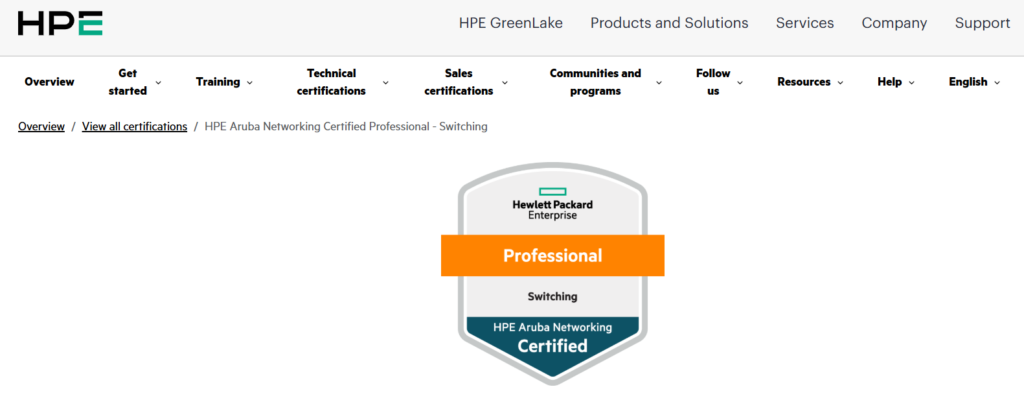
Source – HPE Aruba Networking
This certification is designed for professionals managing enterprise-level wired infrastructures who want to demonstrate advanced expertise in deploying and maintaining Aruba’s AOS-CX switching technologies. With skills spanning from design through operations, ACSP prepares you to take ownership of campus networks, branch offices, and data center connectivity.
Datacipher Recommends
- Start here if you have at least two years of experience supporting or maintaining switching environments and want to validate advanced skills with Aruba’s AOS-CX platform.
- Avoid if you are new to networking or lack hands-on exposure to enterprise switching, build foundational experience or complete entry-level training first.
- Exam insight: The certification requires passing the HPE7-A08 Network Switching Professional exam. There are no formal prerequisites, and the exam is supported by the “Implementing AOS-CX Switching, Rev. 24.31” course.
- Best prep format: Combine Aruba’s recommended instructor-led training with lab practice on real or simulated AOS-CX environments. Focus on creating deployment plans, implementing policies, and troubleshooting across multi-site networks.
Invest in the Certifications That Propel Networking Careers
Being a network engineer means more than keeping cables connected; it means shaping the infrastructure of tomorrow. Certifications aren’t just accolades; they’re accelerators that open doors and build confidence across every stage of your career.
The certifications highlighted above reflect the credentials that employers look for when building, scaling, and securing networks. Whether you are seeking vendor-neutral fundamentals or specialized expertise in platforms like Palo Alto, Juniper, or Aruba, this guide offers clarity on the paths that advance careers.
At Datacipher Education Services, we specialize in hands-on, immersion-style training tailored for working professionals. Our courses go beyond theory, blending real-world labs with expert instruction for these certifications.
Here’s what one of our learners had to say:
“Thank you. Your training sessions were truly informative, and you don’t hesitate to answer questions. You have been one of the best trainers so far.”
– Selven Mooken, Ceredian
If you are ready to level up your networking career, we are here to help you build expertise, pass your exams, and transform your skills into career impact. Explore how our training can power your next move.
Frequently Asked Questions
1. Do I need prior experience before pursuing a networking certification?
Not always. Certifications like CompTIA Network+ or CCNA are designed for beginners and help you build foundational knowledge. More advanced credentials, such as AWS Advanced Networking or Palo Alto PCNSP, require hands-on experience with real-world networks.
2. How long are networking certifications valid?
Most certifications are valid for two to three years. Renewal usually involves retaking the exam or completing continuing education credits.
3. Are there free resources to prepare for networking certifications?
Yes. Platforms like Cisco Learning Network, Juniper Learning Portal, Microsoft Learn, and vendor-specific study guides provide free or low-cost resources. Many also offer practice labs and community support.
4. Do networking certifications help with transitioning into cybersecurity?
Yes. Many cybersecurity roles require a strong networking foundation. Certifications like CCNA or CND (Certified Network Defender) are often considered stepping stones into security-focused roles.

